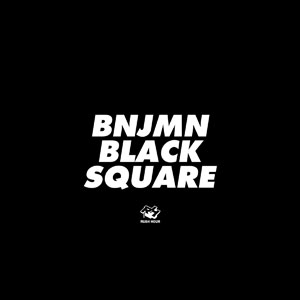BNJMN Black Square
It’s quite possible that Ben Thomas has had the most quietly productive 2011 of any […]

It’s quite possible that Ben Thomas has had the most quietly productive 2011 of any burgeoning electronic artist, dropping his debut LP as BNJMN, Plastic World, on Rush Hour earlier this year and following it up with an impressive EP for the Svetlana imprint shortly thereafter. On Black Square, the young producer from Southern England continues to move further into a world of his own making, presenting nine more expertly crafted slices of dreamy house—with a heavy emphasis on the music’s dreamy aspect.
The seemingly hushed ascent of Thomas’ BNJMN moniker in the electronic music world is certainly not due to a lack of talent, as his ever-evolving take on house and techno seems to have no shortcoming of fascinating ideas. Instead, this perceived quietness may come because Thomas makes the kind of music you really want to keep for yourself. As his songs move and build, they beg you to become absorbed into the patterns which comprise them, unfolding into beautifully intricate, at times tender, structures as they move from beginning to end. Tracks like the slow-brewing “Keep the Power Out” or the Kraut-indebted “Lava” are two of Black Square‘s finest examples. Each begin as rather simple loops which are built upon piece by piece in a slow, methodical manner. But what is so intriguing about the songs is not necessarily the blocks that are added, but how they are added, allowing you to thoroughly inspect every rhythmic and melodic idea on its own before it falls into its place.
Admittedly, using the adjective “dreamy” can be a bit misleading when discussing BNJMN’s work. To be sure, there’s nothing particularly blissful about these songs, as the LP includes moments that are palpably spooky and even unnerving, especially on the string-looping “Wisdom of Uncertainty” or the LP’s ghostly vast title track. There are even times when BNJMN successfully infuses club-ready vibes into his compositions, most notably on “Open the Floodgates,” a tune which pins a bouncing, voice-like melody, icey pads, and futuristic squelches to the record’s heaviest kick drum. Given these diversions, calling the music “dreamy” is instead meant as a reference to the place where Black Square‘s selections take the listener, an unobtrusively fluid aural landscape where one is increasingly rewarded by deeper and deeper exploration.
The only mentionable drawback to these outings is that they feel slightly underdeveloped, at times due to the songs’ truncated length (at least by instrumental techno and house standards). Only “Lava” makes it past the five-minute mark, and a song like “River Way,” which showcases one of the album’s most memorable progressions, clocks in at just above 60 seconds. On Black Square, Thomas proves without a doubt that he can build a proper track, but given the sophistication that comes with his intricate pattern building and detailed, buoyant production, one can’t help but wonder what these songs could become as fully explored compositions. Whether Black Square‘s nine selections are brief explorations or complete compositions isn’t exactly clear, yet, truthfully, it isn’t all that important either. No matter how Thomas intended to present these tracks, they are all a welcome and even more enveloping continuation of his unique, dream-state inducing electronic music.

